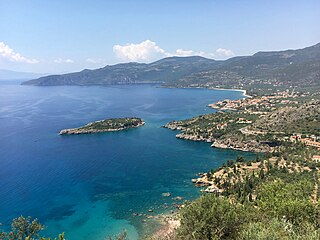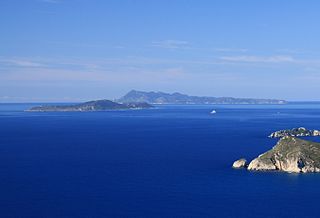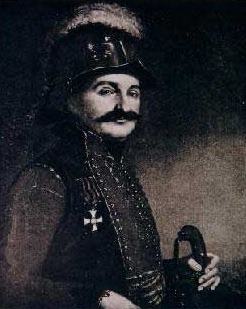
Chios is the fifth largest Greek island, situated in the northern Aegean Sea, and the tenth largest island in the Mediterranean Sea. The island is separated from Turkey by the Chios Strait. Chios is notable for its exports of mastic gum and its nickname is "the Mastic Island". Tourist attractions include its medieval villages and the 11th-century monastery of Nea Moni, a UNESCO World Heritage Site.

The Orlov revolt was a Greek uprising in the Peloponnese and later also in Crete that broke out in February 1770, following the arrival of Russian Admiral Alexey Orlov, commander of the Imperial Russian Navy during the Russo-Turkish War (1768–1774), at the Mani Peninsula. The revolt, a major precursor to the Greek War of Independence, was part of Catherine the Great's so-called "Greek Plan" and was eventually suppressed by the Ottomans by June 1770, three months after it had began.

Oinousses is a barren cluster of 1 larger and 8 smaller islands some 2 kilometres off the north-east coast of the Greek island of Chios and 8 km west of Turkey. Administratively the islands form a municipality within the Chios regional unit, which is part of the North Aegean region. The principal town of the islands and seat of the municipality is also called Oinousses. Oinousses has a small resident population, living primarily in the island's town of Oinousses, and a recently built monastery. The town is centred on a square and a small port; it includes a school, several churches, a Naval high school and a maritime museum. The only other populated settlements are Kástron and Aspalathrókampos.

The Hellenic Coast Guard is the national coast guard of Greece. Like many other coast guards, it is a paramilitary organization that can support the Hellenic Navy in wartime, but resides under separate civilian control in times of peace. The officers and the enlisted members of the Coast Guard are regarded as military personnel under Military's Penal Code. It was founded in 1919 by an Act of Parliament and the legal framework for its function was reformed in 1927. Its primary mission is the enforcement of Greek, European and International law in the maritime areas.

John Constantine Carras was a Greek shipping magnate, grandson of captain and sailing-ship owner Ioannis I. Carras from Kardamyla of Chios.

The Hellenic Merchant Navy refers to the merchant navy of Greece, engaged in commerce and transportation of goods and services universally. It consists of the merchant vessels owned by Greek civilians, flying either the Greek flag or a flag of convenience. As of 2020, Greece is the largest ship owner country in the world in terms of tonnage; with a total deadweight tonnage of 364 million tons and 4,901 Greek-owned vessels. Greece is a maritime nation by tradition, as shipping is arguably the oldest form of occupation of the Greeks and a key element of Greek economic activity since the ancient times. Today it is the second largest contributor to the national economy after tourism. The Greek fleet flies a variety of flags; however, some Greek shipowners gradually return to Greece following the changes to the legislative framework governing their operations and the improvement of infrastructure.

Lambros Katsonis was a Greek privateer of the 18th century who would ultimately sail under the Russian flag with the rank of colonel. He became a knight of the Russian Empire and was awarded the Order of St. George.

Kardamyli is a town by the sea thirty-five kilometers southeast of Kalamata, Greece. It is the seat of the municipality of West Mani in the regional unit of Messenia on the Mani Peninsula.

Sir William Reardon Smith, 1st Baronet was an English shipowner and philanthropist.

Atlas Maritime is an international shipping company with a fleet of tanker vessels engaged in the worldwide transportation of crude oil and refined oil products.

Nikolas D. Pateras is a seventh-generation Greek shipowner and founder of Contships Management Inc. He was born on August 26, 1963, in Athens, Greece, and is originally from the island of Oinousses. He has 3 children, Anastasia, Diamantis and John.
USNS Capt. Arlo L. Olson (T-AK-245) was a United States Maritime Administration C1-M-AV1 type coastal cargo ship constructed as Bell Ringer for the Administration, completed in August 1945 and placed in operation by the War Shipping Administration under its agent, Waterman Steamship Company, until August 1946. The ship was then transferred to the Army under bareboat charter, The Army renamed the ship Capt. Arlo L. Olson, for Captain Arlo L. Olson who was awarded the Medal of Honor in World War II. The ship was among the Army ships transferred to the Navy in 1950 and then operated by the Military Sea Transportation Service as USNS Capt. Arlo L. Olson with hull number T-AK-245 until 1958.

Greece is a maritime nation by tradition, as shipping is arguably the oldest form of occupation of the Greeks and has been a key element of Greek economic activity since ancient times. Today, shipping is the country's most important industry worth $21.9 billion in 2018. If related businesses are added, the figure jumps to $23.7 billion, employs about 392,000 people, and shipping receipts are about 1/3 of the nation's trade deficit. In 2018, the Greek Merchant Navy controlled the world's largest merchant fleet, in terms of tonnage, with a total DWT of 834,649,089 tons and a fleet of 5,626 Greek-owned vessels, according to Lloyd's List. Greece is also ranked in the top for all kinds of ships, including first for tankers and bulk carriers.

SS Arthur M. Huddell is a Liberty ship built in the United States during World War II and is now a museum ship, SS Hellas Liberty, in Greece.
SS Ben Robertson was a Liberty ship, Maritime Commission hull number 2432, built during World War II and named for Clemson University alumnus, journalist, and war correspondent Benjamin F. Robertson, who was killed in the crash of a Pan Am Boeing 314 flying boat, the Yankee Clipper, in the Tagus River, near Lisbon, Portugal, on 22 February 1943.
The Chian Committee was a committee of Chians, consisting of Ambrosios Skaramangas, Loukas Rallis and Georgios Psychas, which was created to ensure the inclusion of Chios in the newly established Greek state. Also undertook the financial and material support of the Chios expedition (1827-1828).

The Diapontian Islands or Diapontia Islands ([Διαπόντια Νησιά] Error: {{Langx}}: transliteration text not Latin script , also known as Othonoi Islands are a Greek island group in the Ionian Sea. They are located northwest of Corfu. The main and the only inhabited islands of the archipelago are Othoni, Ereikoussa and Mathraki. The complex includes also the islets and rocks of Diakopo, Diaplo, Karavi, Kastrino, Leipso, Ostrako, Plaka, Plateia and Tracheia.

The Battle of Andros or Battle of Kafireas was fought on 17–18 May 1790, during the Russo-Turkish War of 1787–1792, between Cape Kafireas and the island of Andros, between the ships of Lambros Katsonis, a Greek privateer in Imperial Russian service, and an Algerian fleet of 30–32 vessels. The battle was a major victory for the Ottomans, as Katsonis lost five ships and his flotilla ceased to exist as an operational unit. On the other hand, the Ottomans suffered heavy casualties as well, and Katsonis was able to escape and reconstitute his forces, remaining active until the end of the war.

Dimitri John Chandris was a Greek shipowner who established Chandris Line, a large passenger shipping line, with his brother Anthony Chandris. Dimitri Chandris was the eldest son of John D. Chandris, a prominent Greek shipowner.

Burns Steamship Company was a shipping company founded in Los Angeles, California on February 25, 1936 by Leroy Burns. Burns Steamship Company had offices in San Francisco and Los Angeles. Leroy Burns was in the lumber business in Ohio in 1937, before he moved to San Francisco. In San Francisco he purchased the ship SS Caddopeak , his first ship, he renamed her the Lurline Burns. In 1940 he moved to Los Angeles with headquarters in Beverly Hills, California]. Burns Steamship Company's ship the SS Lurline Burns was taken over for the World War II effort. Burns Steamship Company closed in 1956.
Reference found but needs to be inserted about the origins of the Lemos family is all from the book "Diplomatic archive of Chios" by Philip Argentini. Published 1954- Cambridge
















